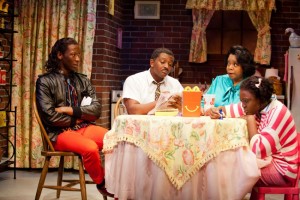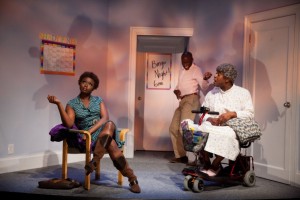There is a certain brand of comedy that bases its entire aesthetic on the idea that genitalia, in and of itself, is hilarious. A lot of trashy movies from the late ’90s and early ’00s were crafted on this basis. Watching BOOTYCANDY, which opened last night at the Wilma, I was reminded of a scene from Sacha Baron Cohen’s Bruno, in which a hairless penis gyrates onscreen for a solid fifteen seconds, entirely devoid of context. The joke, in Cohen’s film, was the gratuity itself; both the viewer and the filmmaker know the penis is gratuitous, and so they laugh together over the silliness of arbitrary nudity.

In BOOTYCANDY, the penis is the joke. The penis is supposed to be funny by itself. When Ross Beschler, playing one of his several parts in this elongated sketch comedy, whipped out his member and slapped it on a barroom table for no reason during a scene entitled “The Last Gay Play,” I was struck by how much it looked like my own penis. And while I happen to think there are many great things about my penis, I have never found it very funny.
In BOOTYCANDY, there is a character named Genitalia. Like most of writer-director Robert O’Hara’s gags, this one is funny for about ten or twenty lines. But the sketches that masquerade here as a play are too lengthy and meandering to remain funny for very long. Early on, we are presented with a preacher—played with perfect comedic grace and timing by Lance Coadie Williams—who reveals himself to be a cross-dressing homosexual. Williams is uproarious, but the writing takes the scene too far into absurdity and repetition, and the joke becomes a broken record.
More bothersome still is the fact that the sketches themselves don’t all connect to each other the way O’Hara seems to have intended. The press materials for BOOTYCANDY state that the play was “inspired by vaudeville.” When I read that, I thought: bullshit. That’s just a sophisticated way of saying “sketch comedy.” I desperately wanted the play to prove me wrong, but was disappointed.

BOOTYCANDY is told in sketches that clumsily add up to the story of a young man (Phillip James Brannon) and his sexual misadventures as he attempts to forge an identity as a gay black man. There are moments of poignancy: more than once, the house lights come up and the audience is thoroughly a part of the production. Brannon’s journey from pre-pubescent innocence to adolescent confusion to adult crisis is gathered piecemeal from sketches that are sometimes comic and sometimes serious. Brannon is a delight to watch as he makes these transitions.
But as much as the playwright seems concerned with the lead character’s story, many of the episodes in BOOTYCANDY go nowhere, and often aren’t funny enough to make up for that fact. The aforementioned Genitalia gets a scene that begins funny-ish, but stretches its original joke too far and lapses into redundancy. A four-way phone call sketch is played with energy and wit by Jocelyn Bioh and Benja Kay Thomas (not to mention some incredible costume trickery; applause to costume and set designer Clint Ramos), but this too is a dead end. The story that emerges at the end is rigged together with bubble gum and Scotch tape from select pieces of the play, but the scenes that don’t fit stick out like a cross-dressing priest.

After a few minutes of watching BOOTYCANDY, we get it: It’s a sketch comedy about homosexuality. When a sketch turns very serious, we’re blindsided by it, and not in a good way. The play has introduced us to a world that is funny and absurd (in the very first sketch, Brannon plays a boy of maybe ten, complete with Superman underwear) and in shifting gears to the serious, the narrative comes off as forced, cheap, and self-conscious. O’Hara’s aim may indeed be to make his audience uncomfortable and provoke meaningful thought about the many touchy themes on which BOOTYCANDY touches. Instead, we are uncomfortable simply because the play leads us to believe that it exists in one universe and then switches gears and creates a whole new one, based on heavy drama. In doing so, the play assumes a moral and intellectual superiority to its audience, which feels insulting.
All the vaudeville talk in the promos is a mask for the fact that O’Hara has failed to decide what he wants to write a play about. The beginning is about sexuality; toward the end of the first act, sketches become race-oriented—fine subject matter, but these scenes bear no connection to the earlier material. O’Hara has not reconciled his various ideas and combined the play’s shifting interests in a coherent message or theme, and so the audience must do the work for him.
I wanted very much to like this play. The acting is superb, and if you see BOOTYCANDY for any reason, see it to watch some talented actors get crazy for two hours. The writing wavers between clunky, outrageous, and heavy-handed, but the structure is what kills it. BOOTYCANDY holds the seeds of a very good play, but they are hidden underneath layers of preachiness and attention-deficit disorder. Tickets start at $39. May 15 to June 16, 2013. wilmatheater.org.

Great review, sounds like the only real problem was the playwright, it’s a shame he couldn’t get his shit together.
This is a shit review hahaha!!!!